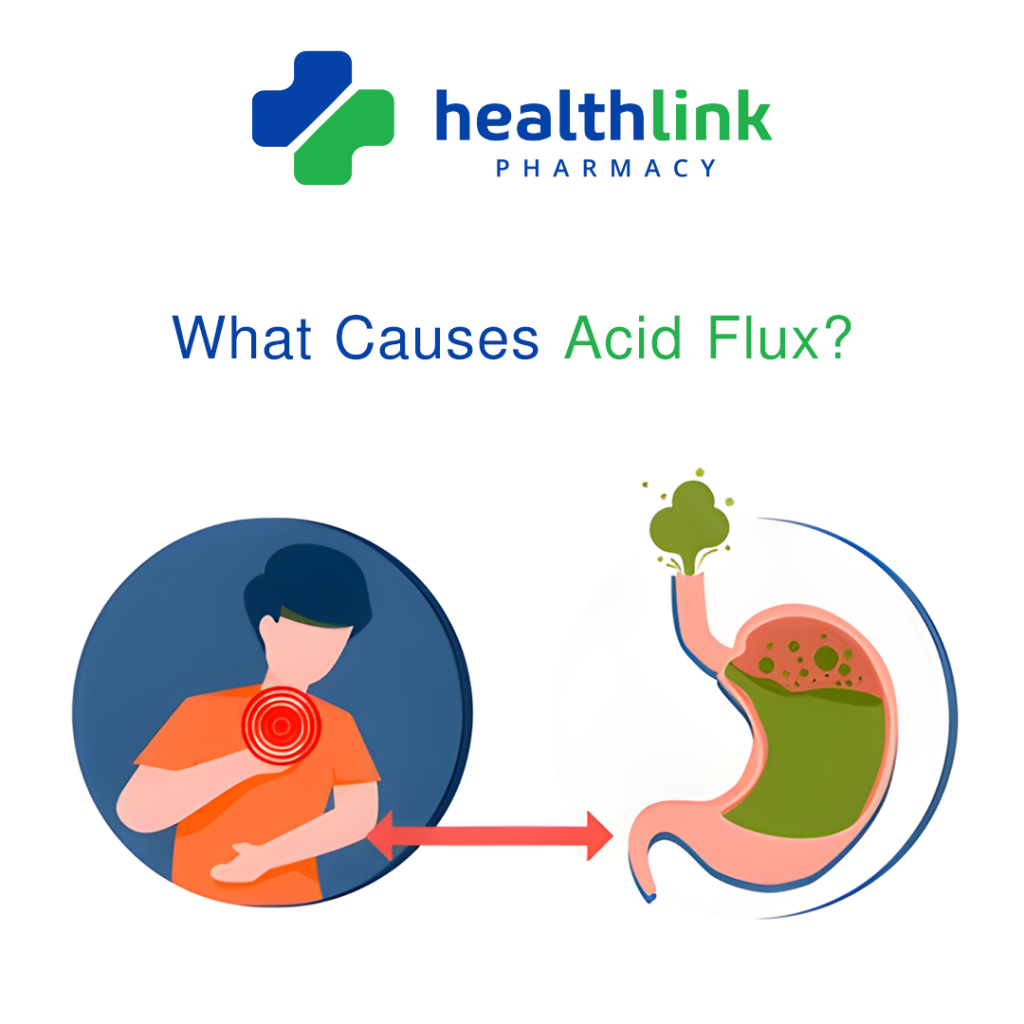Introduction to Acid Flux
Acid flux, also known as acid reflux or gastroesophageal reflux disease (GERD), is common when stomach acid flows back up into the esophagus, causing discomfort and sometimes pain. Understanding the causes of acid flux is essential to manage better and prevent this condition.
Causes of Acid Flux
- Unhealthy Diet
One of the primary culprits behind acid flux is an unhealthy diet. Consuming fatty, fried, or spicy foods can relax the lower esophageal sphincter (LES), the muscle that usually prevents stomach acid from flowing back up. This relaxation allows acid to travel upwards, leading to acid reflux.
- Obesity
Being overweight or obese increases the risk of acid flux. Excess weight puts pressure on the abdomen, pushing stomach contents, including acid, into the esophagus. This pressure can weaken the LES, making reflux more likely.
- Pregnancy
Pregnant women often experience acid flux due to hormonal changes and the growing uterus putting pressure on the stomach. This pressure can force acid into the esophagus, causing heartburn and discomfort.
- Smoking
Smoking is a significant risk factor for acid flux. Cigarette smoke irritates the lining of the esophagus and can weaken the LES, allowing acid to flow back up more quickly.
- Hiatal Hernia
A hiatal hernia occurs when part of the stomach pushes up through the diaphragm into the chest cavity. This condition can disrupt the LES and contribute to acid reflux.
- Stress and Anxiety
Stress and anxiety can exacerbate acid flux symptoms. These emotional states can lead to changes in eating habits, increased stomach acid production, and decreased LES function.
- Medications
Certain medications, such as nonsteroidal anti-inflammatory drugs (NSAIDs), aspirin, and some muscle relaxers, can contribute to acid reflux by irritating the esophagus or weakening the LES.
- Alcohol Consumption
Alcohol can relax the LES and increase stomach acid production, both of which can contribute to acid reflux. Excessive alcohol consumption is a known trigger for acid flux.
- Eating Habits
Eating large meals, especially before bedtime, can lead to acid reflux. Lying down after eating can also allow gravity to work against the LES, causing acid to flow upwards.
Impact on Health
Untreated acid flux can lead to complications such as esophagitis (inflammation of the esophagus), esophageal strictures (narrowing of the esophagus), and Barrett’s esophagus (a precancerous condition). Managing acid flux is essential to reduce the risk of these severe complications.
Prevention and Management
Lifestyle Changes
- Weight Management: Maintain a healthy weight to reduce pressure on the abdomen.
- Quit Smoking: If you smoke, quitting can improve acid flux symptoms.
- Stress Reduction: Practice stress-reducing techniques such as yoga or meditation.
Dietary Adjustments
- Avoid Trigger Foods: Spicy, fatty, and acidic foods can trigger acid reflux.
- Eat Smaller Meals: Opt for smaller, more frequent meals to prevent stomach overload.
- Limit Alcohol and Caffeine: Both can contribute to acid reflux.
Medical Treatments
- Antacids: Over-the-counter antacids can provide temporary relief from acid reflux symptoms.
- Proton Pump Inhibitors (PPIs) reduce stomach acid production and are often prescribed for acid reflux.
- Surgery: In severe cases, surgery to strengthen the LES or repair a hiatal hernia may be necessary.
Home Remedies
Natural Remedies
- Ginger: Ginger tea or supplements can help alleviate acid reflux symptoms.
- Aloe Vera Juice: Known for its soothing properties, aloe vera juice can calm the esophagus.
- Apple Cider Vinegar: Some people relieve acid reflux by diluting apple cider vinegar in water despite being acidic.
Tips for Relief
- Elevate the Head of Your Bed: Using bed risers to elevate the head of your bed can help prevent acid from flowing up while you sleep.
- Chew Gum: Chewing sugar-free gum can stimulate saliva production, which can help neutralize acid in the esophagus.
- Wear Loose Clothing: Tight clothing can pressure the abdomen and worsen acid reflux.
Conclusion
Understanding the causes of acid flux is crucial for effective management and prevention. By making lifestyle changes, adjusting eating habits, and seeking appropriate medical treatments, individuals can reduce the frequency and severity of acid reflux symptoms.
FAQs About Acid Flux
Is acid flux the same as heartburn?
While heartburn is a common symptom of acid flux, acid flux refers to the broader condition where stomach acid flows back into the esophagus, causing various symptoms beyond heartburn.
Can acid flux be cured completely?
While acid flux can be managed effectively with lifestyle changes and medications, it is often a chronic condition. However, many people find relief and can control their symptoms with the right approach.
How long does acid flux typically last after eating?
Acid reflux symptoms can last from a few minutes to several hours after eating, depending on the individual and their triggers.
Are there specific foods that can worsen acid flux?
Yes, spicy, fatty, and acidic foods are common triggers for acid reflux. If you are prone to acid flux, it’s best to avoid these foods.
When should I see a doctor about acid flux?
If you experience acid reflux symptoms more than twice a week, have difficulty swallowing, or if your symptoms are severe and affecting your quality of life, it’s advisable to consult a doctor.

